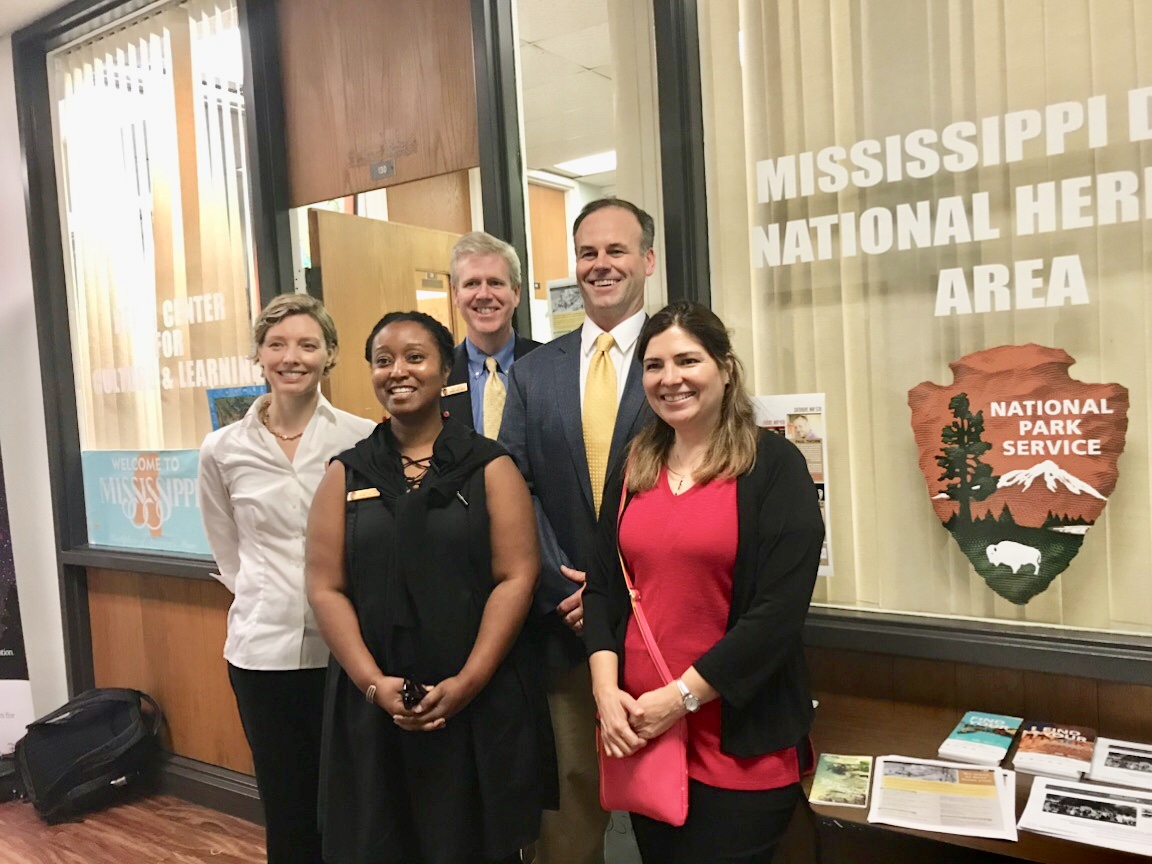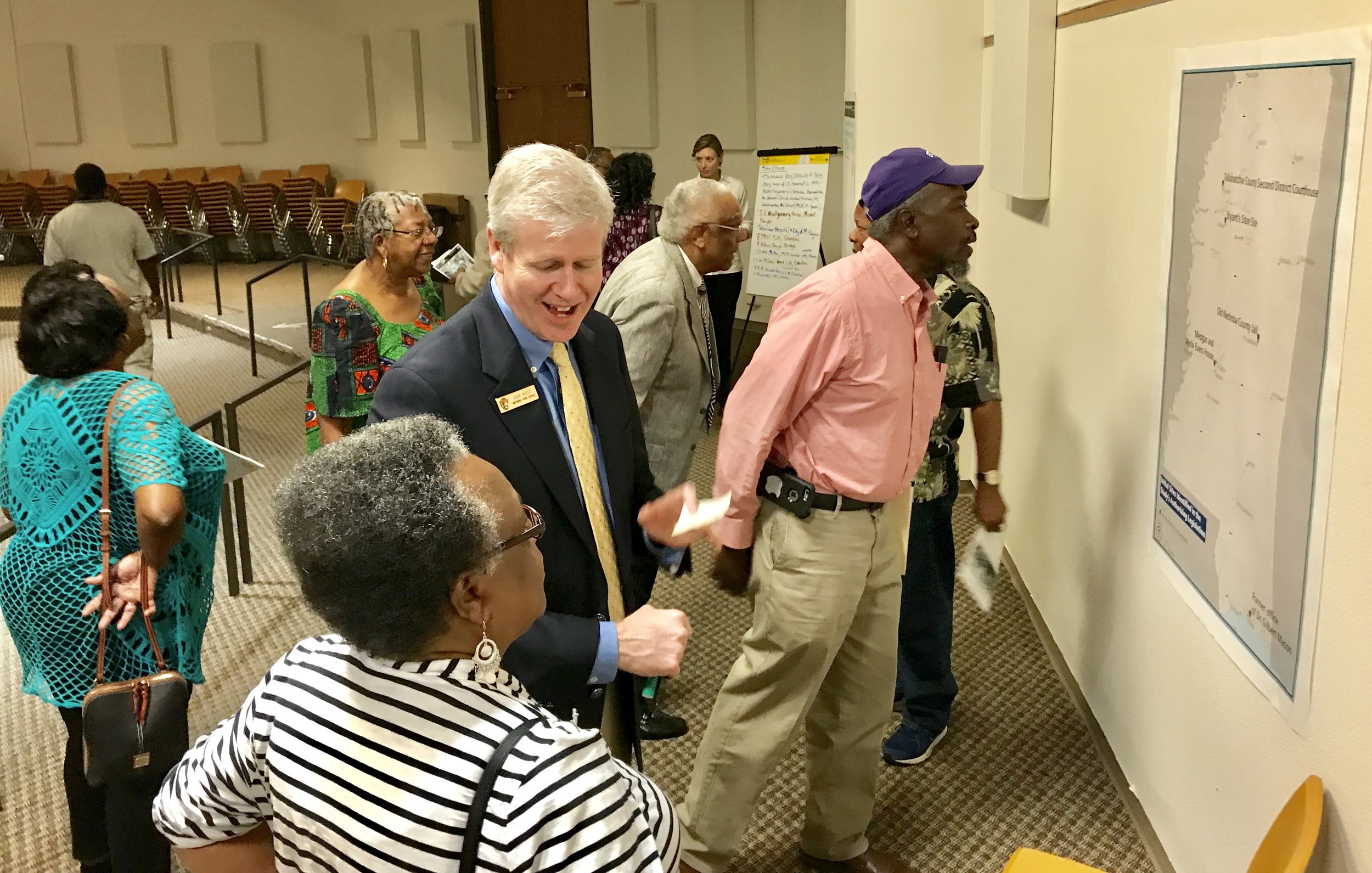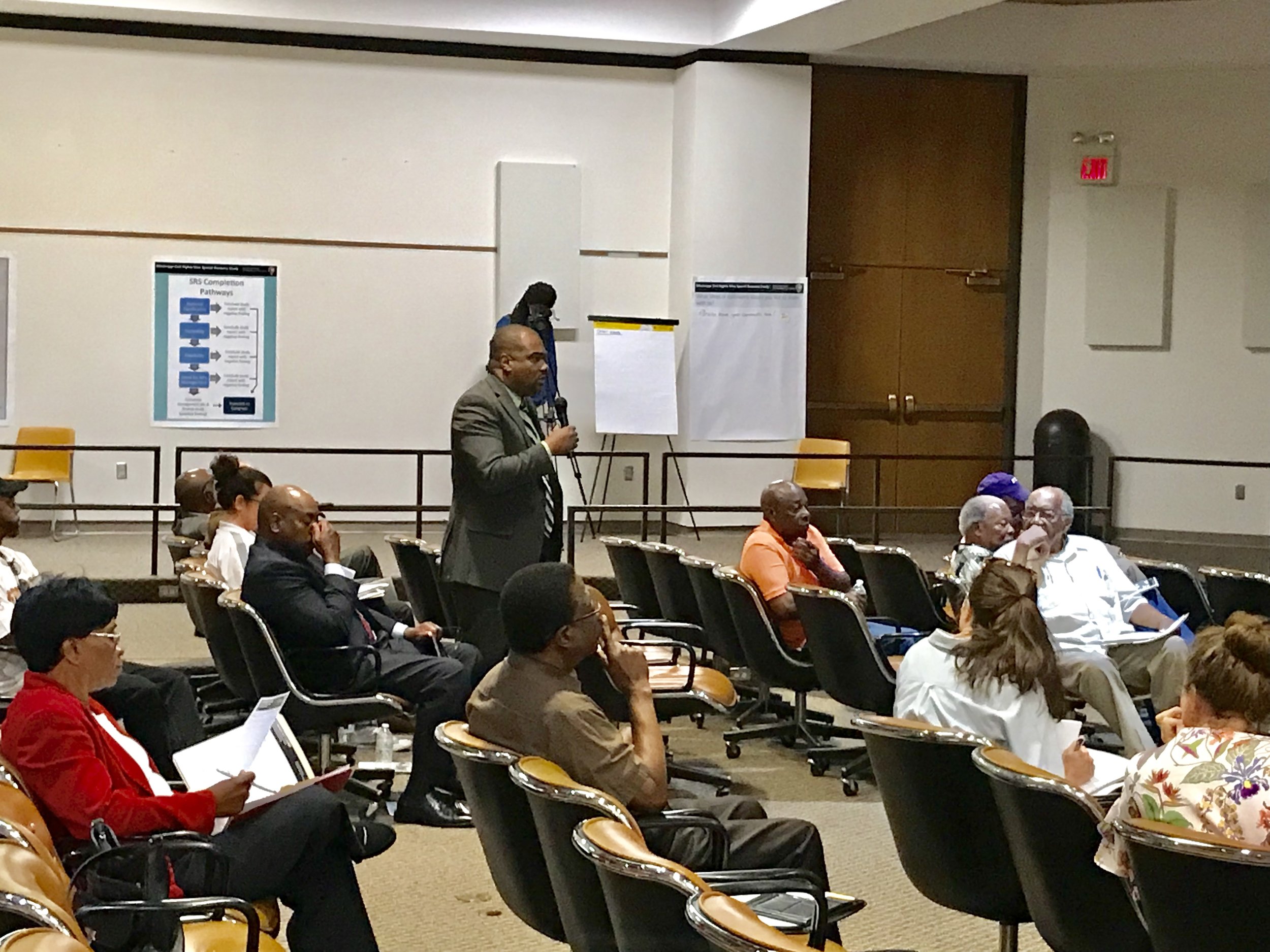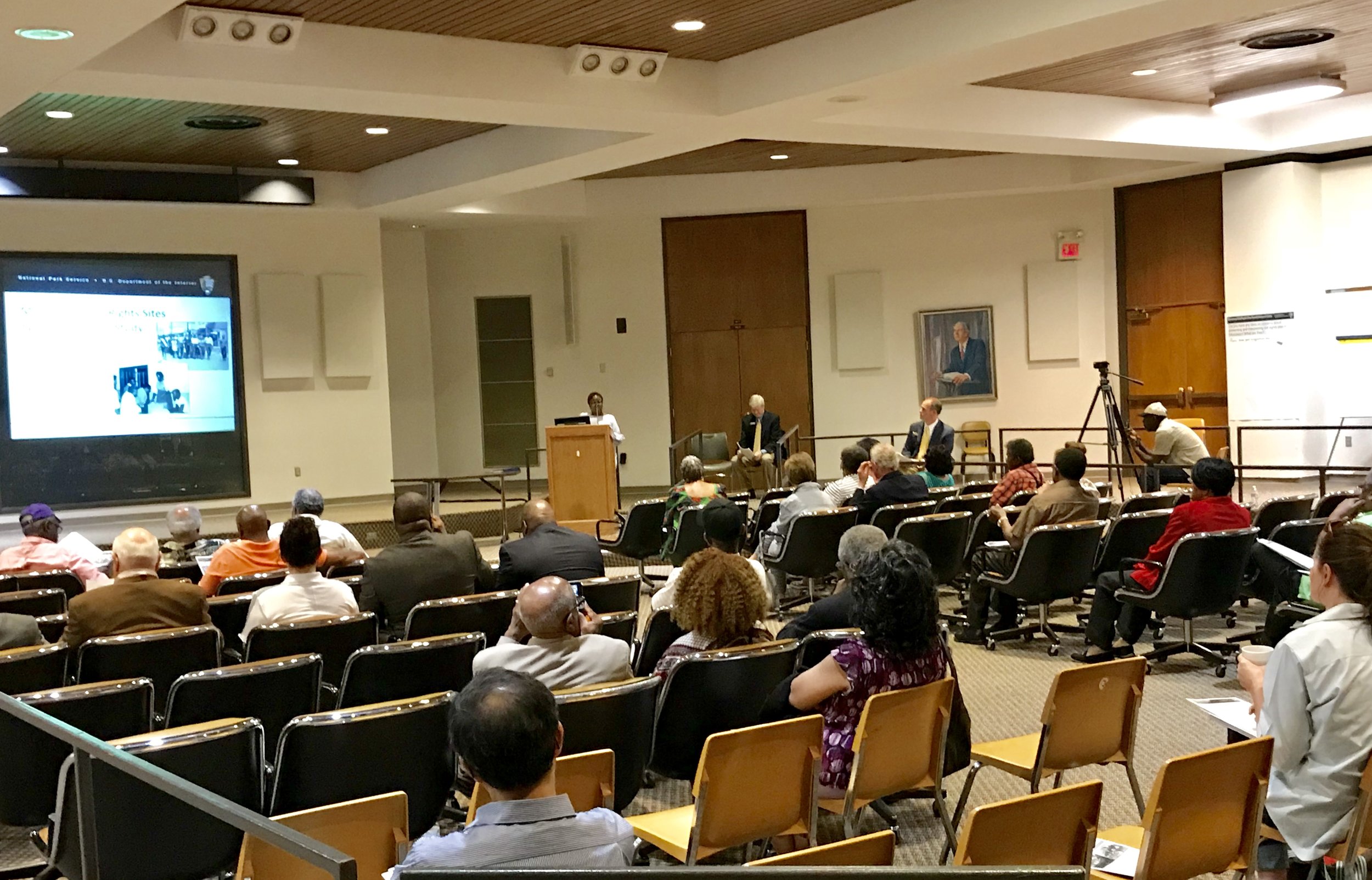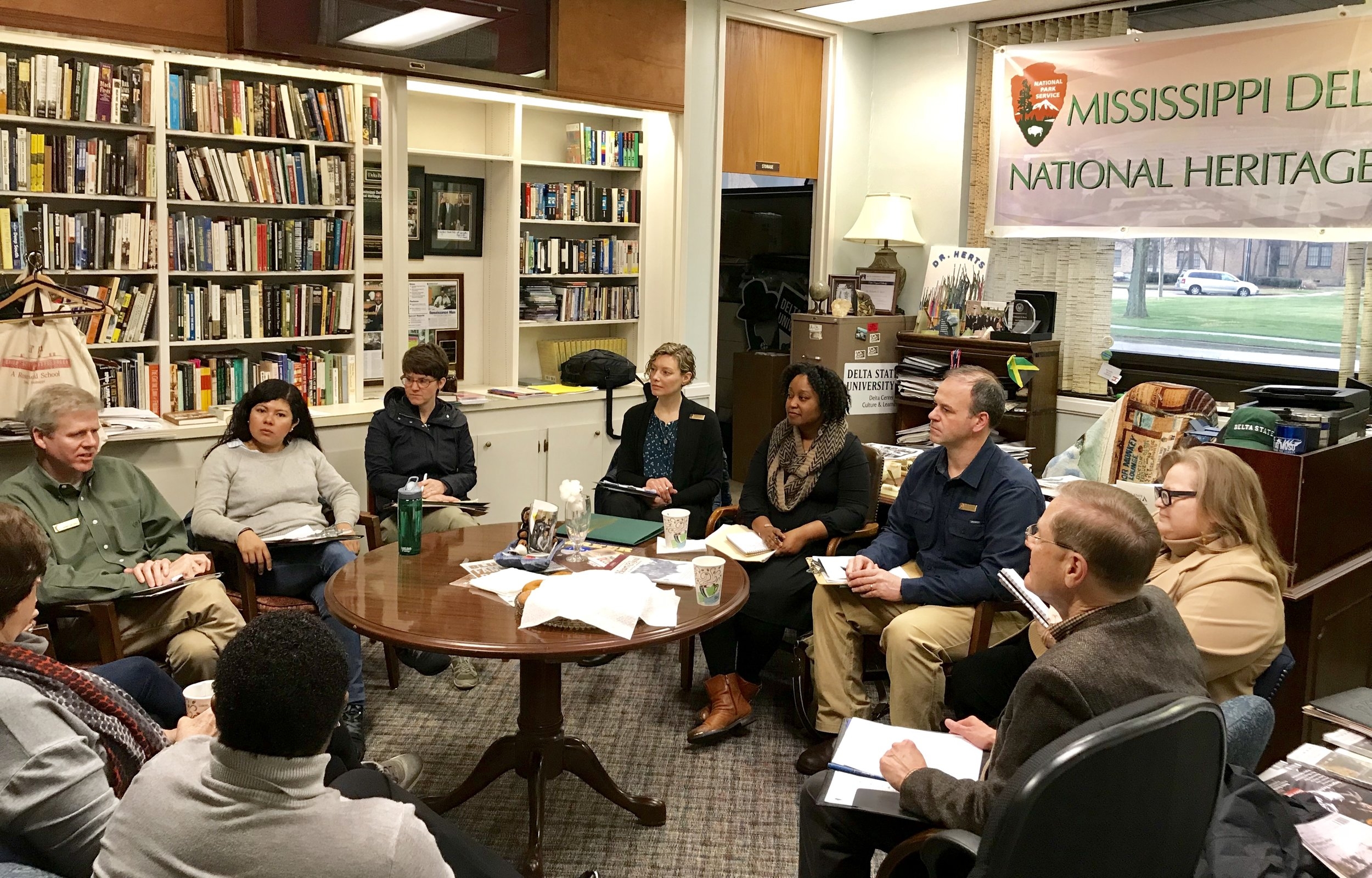Delta Center, MDNHA and statewide partners present civil rights play at GRAMMY Museum® Mississippi
Delta Center, MDNHA promote Mississippi Delta tourism at Chicago Blues Festival
Delta Center hosts ninth year of NEH Most Southern Place on Earth
Delta Center, MDNHA host NPS civil rights open house at Delta State
The Delta Center and the Mississippi Delta National Heritage Area recently hosted an open house session for the National Park Service's Mississippi Civil Rights Sites Special Resource Study. One of six open house sessions held throughout the state – including another Delta region open house at Tallahatchie County Courthouse – the meeting provided a space for Mississippi Delta residents to share information about significant civil rights landmarks, people, and events in their communities.
NPS has encouraged those who were not able to attend the open house sessions to register their comments on the resource study website at https://parkplanning.nps.gov/. The Mississippi Civil Rights Sites Special Resource Study is listed with the Southeast Regional Office and a review ending date of June 1, 2018. According to the website, all public comments are due by that date.
"As Congressman Bennie Thompson has stated, the National Park Service has a wonderful opportunity to preserve and honor the history of civil rights and the struggle for freedom here in Mississippi,” said Keilah Spann, NPS Southeast Regional Office cultural resources historian. “We can accomplish this in part by connecting with the communities and the people here. So much of the history of the civil rights movement is still within the people who were active in it and are living. We have a unique opportunity yet a limited window of time to capture and preserve this history."
Of the approximately 40 attendees at the Delta State open house, several were community and civil rights leaders including:
- Mr. Charles McLaurin of Indianola who worked with Fannie Lou Hamer;
- Ms. Jessie Williams, a retired history and American government educator who initiated the integration of Shaw High School as its first African American teacher;
- Dr. Matthew Holden, a Mound Bayou native and retired political science professor researching the life of Mound Bayou founder Isaiah T. Montgomery; and
- Senator David Jordan of Greenwood who attended the Emmett Till trial at Tallahatchie County Courthouse in 1955.
"We are pleased that the National Park Service resource study team asked to host their first civil rights open house session at Delta State," said Dr. Rolando Herts, director of The Delta Center and executive director of the Mississippi Delta National Heritage Area. "This conversation started during the team's initial visit to the Mississippi Delta in February through Mississippi Department of Archives and History. To have two civil rights open house sessions here in our region sends a strong message that the Mississippi Delta is a national civil rights heritage treasure. This is an historic opportunity for residents and entire communities to proudly share their civil rights stories."
Later that day, a second NPS open house session also was held at the Tallahatchie County Courthouse in Sumner. The session was hosted by the Emmett Till Interpretive Center.
“The National Park Service study helps to solidify the importance of the many Civil Rights Movement sites in Mississippi,” said Patrick Weems, executive director of the Emmett Till Interpretive Center. “We look forward toworking with them, and we were proud to host them in Sumner where over fifty community members came out to voice their opinions.”
In 2017, U.S. Congress passed a law directing NPS to conduct a special resource study of Mississippi's nationally significant civil rights sites. Initial Mississippi Delta sites include key landmarks of the Emmett Till murder such as Tallahatchie County Courthouse in Sumner, MS, and Bryant's Grocery Store in Money, MS.
The open house sessions are part of NPS' efforts to gather information about additional civil rights sites in the Mississippi Delta and throughout the state. They will report their findings to Congress when the study has been completed.
National Humanities Alliance recognizes Delta Center’s “Most Southern” as exemplary program
“Most Southern” Institute participants view a Mississippi Blues Trail marker in Scott, Mississippi.
The National Humanities Alliance recently recognized The Delta Center for Culture and Learning’s “Most Southern Place on Earth” Institute as a one of a select group of high-impact programs funded by the National Endowment for the Humanities.
“Most Southern” is featured on the alliance’s NEH For All website, www.nehforall.org, which highlights impacts of the NEH across the United States.
“It is our great privilege to feature the Delta Center on NEH for All, a website that showcases outstanding NEH-funded work in every state,” said Dr. Stephen Kidd, executive director of the National Humanities Alliance. “The National Endowment for the Humanities funds thousands of projects across the country. Among these, the Delta Center’s work with The Most Southern Place on Earth is truly exemplary.”
On the website, “Most Southern” is noted for having impacts in several key measurement areas, including Enriching K-12 Education; Providing Lifelong Learning Opportunities for Diverse Audiences; Facilitating Community Dialogue; Fostering Local Tourism Economies; and Promoting Civic Education.
The alliance also notes that “Most Southern” is part of the Delta Center’s larger work managing the Mississippi Delta National Heritage Area.
“Through Most Southern, The Delta Center attracts K-12 educators from throughout the country to the Mississippi Delta,” said Dr. Rolando Herts, director of The Delta Center and executive director of the MDNHA. “They spend a full week here learning about the region’s diverse cultural heritage, and they take those lessons home to their school communities. These educational and cultural heritage tourists become heritage area ambassadors who tell our stories nationwide. Some of them even come back with student groups and family members.”
Summer 2018 will be the ninth year that the NEH has funded “Most Southern.” Total funding received since the program’s inception is over $1.5 million.
Over 500 K-12 educators have completed the workshops. The program continues to generate considerable demand among the nation’s top K-12 educators, including award-winning principals, librarians, and National Board Certified teachers. This month, The Delta Center received over 300 applications competing for 72 slots to participate in the June and July 2018 sessions.
“The Delta Center has brought hundreds of K–12 teachers to the Mississippi Delta and provided them with an intellectually-rigorous educational experience that helps them understand and become ambassadors for the region’s rich cultural heritage,” said Kidd. “By helping newcomers explore the region’s cultural heritage sites, the Delta Center boosts its local economy. At the same time, the quality teaching practices the Delta Center fosters have had a deep impact on schools across our nation.”
The National Humanities Alliance Foundation advances the humanities by conducting and supporting research on the humanities and communicating the value of the humanities to a range of audiences including elected officials and the general public. For more information, visit https://www.nhalliance.org/.
The mission of The Delta Center is to promote greater understanding of Mississippi Delta culture and history and its significance to the world through education, partnerships and community engagement. The Delta Center serves as the management entity of the MDNHA and is the home of the International Delta Blues Project and the NEH “Most Southern Place on Earth” Institute. For more information, visit http://deltacenterdsu.com/.
MDNHA, Delta Center share “Heart & Soul” of Mississippi Delta in D.C.
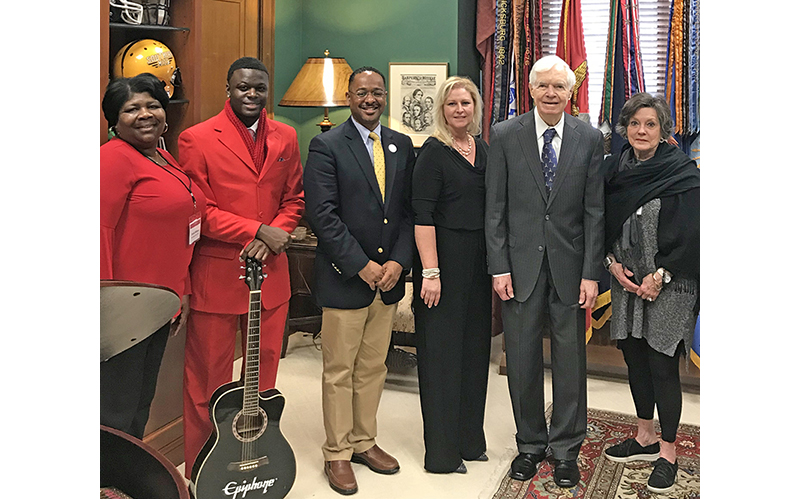
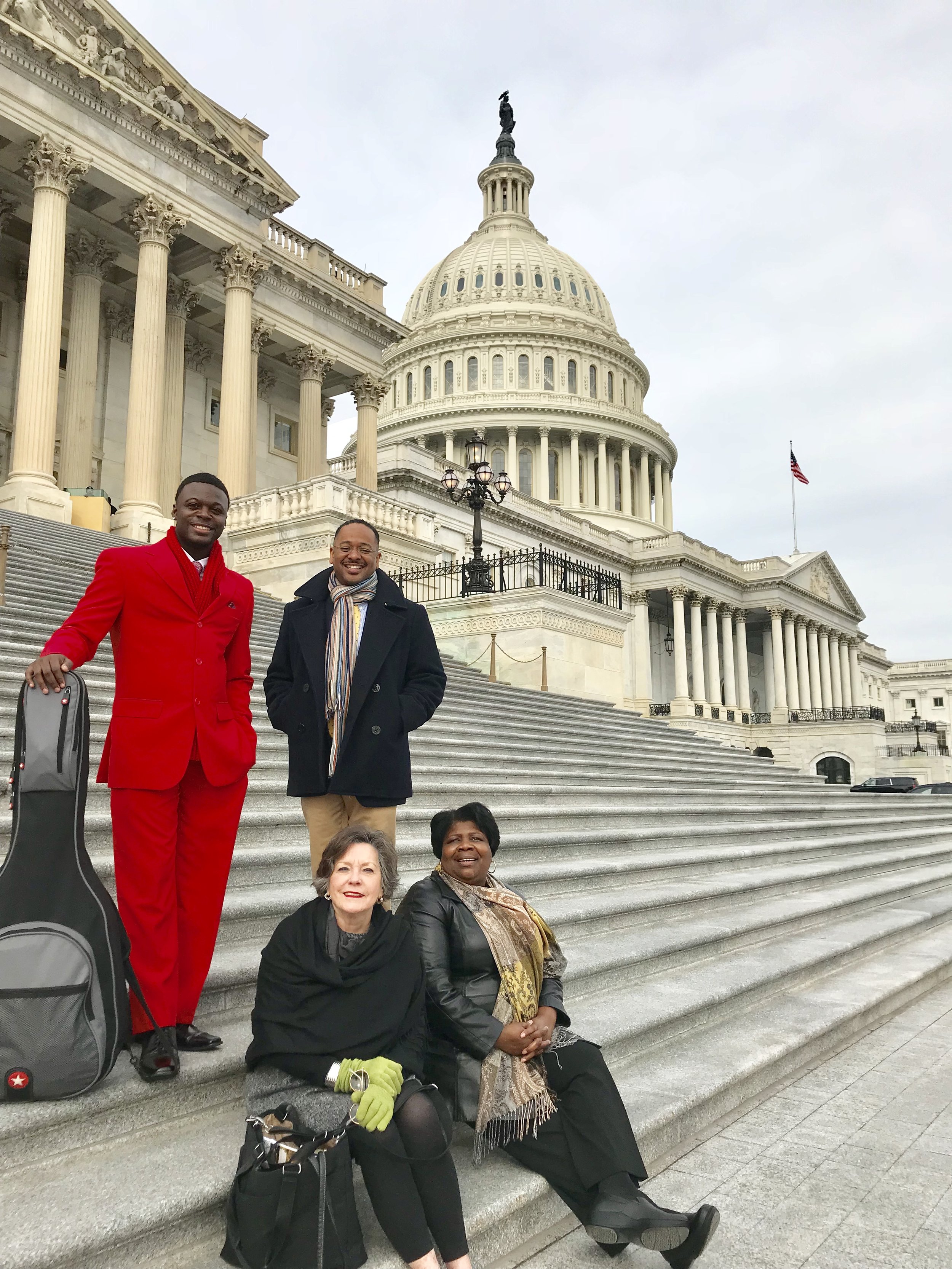
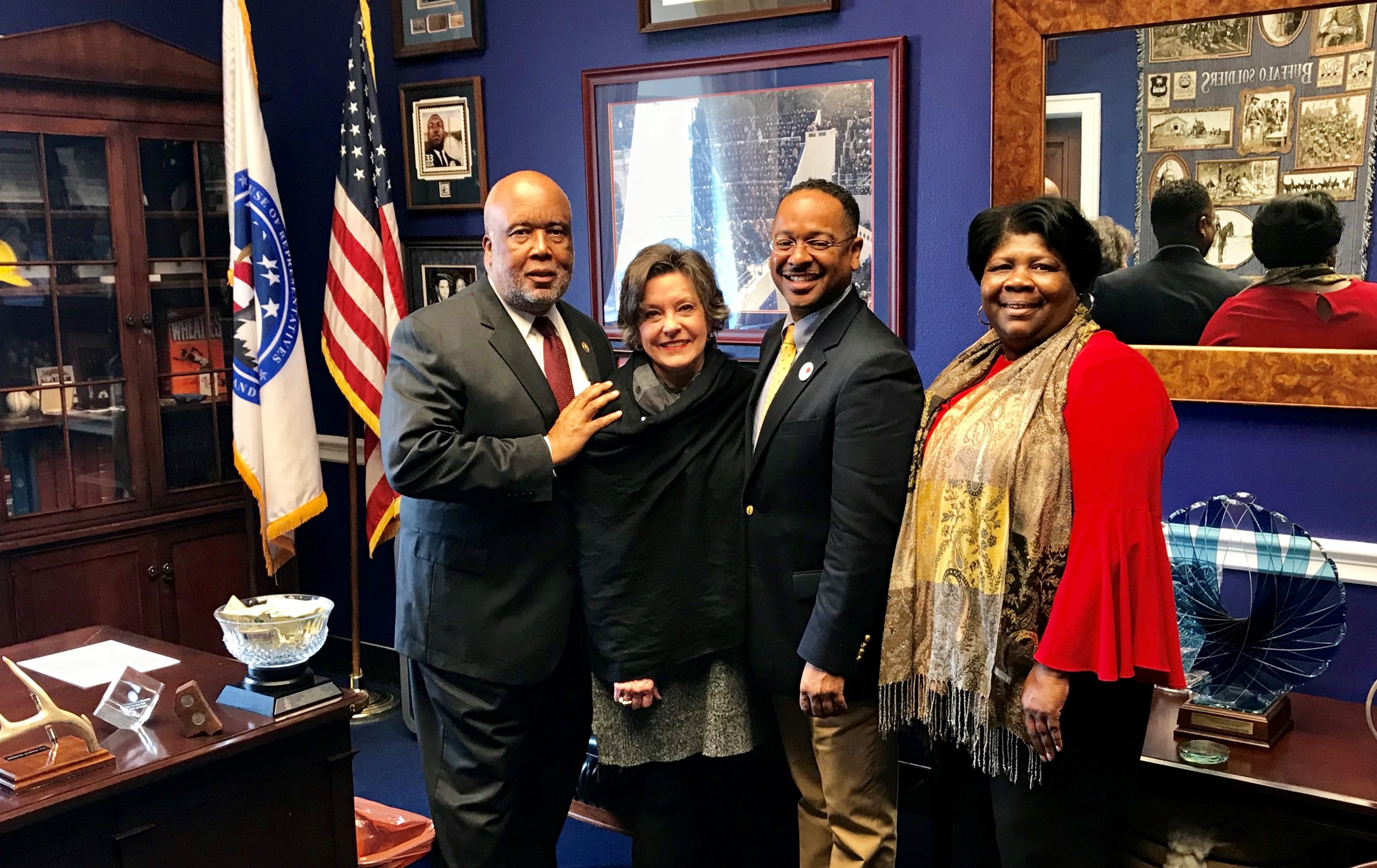
Senator Thad Cochran (second from right) recently enjoyed a visit with representatives from The Delta Center for Culture and Learning at Delta State University. The meeting included a performance by Delta State graduate Keith Johnson (second from left), the great nephew of Muddy Waters. The Delta Center is the management entity for the Mississippi Delta National Heritage Area (MDNHA). Also pictured (left to right) are Shelia Winters, DCCL program associate for projects; Dr. Rolando Herts, DCCL director and MDNHA executive director; Rhonda Price, executive director of Mississippi Gulf Coast National Heritage Area; and Lee Aylward, DCCL program associate for education and community outreach.
The Delta Center for Culture and Learning at Delta State University recently attended the Alliance of National Heritage Areas’ annual meeting on behalf of the Mississippi Delta National Heritage Area. The meeting took place during Valentine’s Day week in Washington, D.C.
During the Alliance’s “Heart & Soul” congressional breakfast at the Rayburn House Office Building, the MDNHA and Delta State were honored for receiving National Park Service Centennial Awards for creating the Delta Jewels Oral History Partnership. This cultural heritage interpretation project has engaged over 1,000 residents and visitors in honoring the lives of unsung African American church mothers featured in Alysia Burton Steele’s book “Delta Jewels: In Search of My Grandmother’s Wisdom.”
Delta State was the only higher education institution and MDNHA is the only National Heritage Area in the country that received NPS Centennial Awards this year.
In recognition of the MDNHA’s rich cultural heritage, the Alliance of National Heritage Areas invited Keith Johnson, “Prince of the Delta Blues,” to be the featured performer at the “Heart & Soul” breakfast. A graduate of the Delta Music Institute at Delta State, Johnson is currently a graduate assistant in The Delta Center pursuing a Master of Business Administration at Delta State. He also is the great nephew of Delta Blues legend, Muddy Waters.
After the breakfast, the Delta delegation met with Mississippi legislators Senator Thad Cochran, Congressman Bennie Thompson and Senator Roger Wicker. They shared copies of the MDNHA’s 2014-2016 progress report and forthcoming economic impact study. During the visit with Cochran, they were joined by Rhonda Price, executive director of the Mississippi Gulf Coast National Heritage Area.
“I am very pleased that our team was able to thank Cochran, Thompson and Wicker in person for their continued support of National Heritage Areas,” said Dr. Rolando Herts, director of The Delta Center and executive director of the MDNHA. “The Mississippi Delta, Hills and Gulf Coast National Heritage Areas are acknowledged by so many of our colleagues and supporters for doing great work in the communities we proudly serve.”
Johnson was especially excited to visit Cochran’s office where he was invited to perform his song “Come to Mississippi.”
“The song explores the culture of the Mississippi Delta. It expresses the feeling of blues musicians that are from Mississippi and includes references to hit songs they have written,” said Johnson. “I wrote this song so that I could connect with the Delta’s heritage, which includes blues music and more. I am honored that Senator Cochran invited me to perform it for him.”
The mission of The Delta Center is to promote greater understanding of Mississippi Delta culture and history and its significance to the world through education, partnerships and community engagement. The Delta Center serves as the management entity of the MDNHA and is the home of the International Delta Blues Project. For more information, visit http://deltacenterdsu.com/.
The MDNHA is a cultural heritage partnership between the people of the Mississippi Delta and the National Park Service. Led by Herts, it includes18 counties that contain land located in the alluvial floodplain of the Mississippi Delta: Bolivar, Carroll, Coahoma, DeSoto, Holmes, Humphreys, Issaquena, Leflore, Panola, Quitman, Sharkey, Sunflower, Tallahatchie, Tate, Tunica, Warren, Washington and Yazoo. The MDNHA was designated by U.S. Congress in 2009 and is governed by a board of directors representing agencies and organizations defined in the congressional legislation. More information about the MDNHA, including the complete approved management plan, is available at www.msdeltaheritage.com.
MDNHA offers $200,000 in grant money
BB King Day representatives from Mississippi Valley State University with MDNHA board member Meg Cooper (far left) and executive director Dr. Rolando Herts (far right). Mississippi Valley is one of several organizations that received MDNHA grants in 2017.
The Mississippi Delta National Heritage Area is making up to $200,000 available for grants in 2018.
MDNHA will hold a series of workshops across the Delta to present information about available grants that support local projects and activities that further MDNHA’s mission of fostering preservation, perpetuation and celebration of the Delta’s heritage through a climate of collaboration and sustainable economic development.
The deadline for applications is March 26. Nonprofits, educational institutions, schools, units of local government and others are eligible for the grants and encouraged to attend one of the three workshops. Grants up to $24,500 are available.
At each workshop, MDNHA will present the guidelines for the program, and review application and reporting requirements. Other resources available to support heritage and cultural programs will also be discussed. Complete program regulations and application forms will be available on MDNHA’s website at www.msdeltaheritage.com.
The workshops are scheduled for:
Jan. 30 – 1 p.m. to 4 p.m.
The Capps Center, Room 101 (Seminar Room)
920 US Highway 82 West, Indianola
Feb. 1 – 1 p.m. to 4 p.m.
The Haraway Center, Northwest Mississippi Community College
4975 Highway 51 North, Senatobia
(campus map available at http://www.northwestms.edu)
Feb. 8, 2017 – 1 p.m. to 4 p.m.
Southern Cultural Heritage Foundation
1302 Adams Street, Vicksburg
The MDNHA is a cultural heritage partnership between the people of the Mississippi Delta and the National Park Service. Led by Dr. Rolando Herts, director of The Delta Center for Culture and Learning at Delta State University, the MDNHA includes 18 counties that contain land located in the alluvial floodplain of the Mississippi Delta: Bolivar, Carroll, Coahoma, DeSoto, Holmes, Humphreys, Issaquena, Leflore, Panola, Quitman, Sharkey, Sunflower, Tallahatchie, Tate, Tunica, Warren, Washington and Yazoo.
The MDNHA was designated by U.S. Congress in 2009 and is governed by a board of directors representing agencies and organizations defined in the congressional legislation. More information about the MDNHA, including the complete approved management plan, is available at www.msdeltaheritage.com. Information about the grants program is also available on the website.
For more information, contact The Delta Center for Culture and Learning at 662-846-4311, or email swinters@deltastate.edu or grants@msdeltaheritage.com.
The mission of The Delta Center is to promote greater understanding of Mississippi Delta culture and history and its significance to the world through education, partnerships and community engagement. The Delta Center serves as the management entity of the MDNHA and is the home of the International Delta Blues Project. For more information, visit http://deltacenterdsu.com/.
Delta Center represents NEH “Most Southern” at national social studies conference
Delta Center staff members, Dr. Rolando Herts (far left), and Lee Aylward (far right), gather with NEH “Most Southern” alums in front of Delta State’s Emmett Till traveling exhibit in San Francisco, California.
The Delta Center for Culture and Learning at Delta State recently attended the 97th annual Conference of the National Council for the Social Studies. The conference took place at the Moscone Center in San Francisco, California.
Delta Center staff members Dr. Rolando Herts and Lee Aylward promoted “The Most Southern Place on Earth: Music, Culture, and History of the Mississippi Delta” Institute funded by the National Endowment for the Humanities. Herts and Aylward are co-directors for the “Most Southern” Institute, which will be offered to K-12 educators from throughout the country at Delta State University.
The Delta Center teamed with “Most Southern” alumni Mary Heidi Imhof and Kelly Scanlon from Fairbanks, Alaska. Together, they presented on the educational significance of the “Most Southern” institute to K-12 educators, their students and their school communities.
Several other “Most Southern” alumni attended the conference, including educators from New Jersey, Massachusetts and California.
“The Delta Center’s mission is to promote the Mississippi Delta’s culture and history and its significance to the world,” said Herts. “We are pleased NEH has continued to help us fulfill this mission by supporting presentations of the ‘Most Southern’ institute at important educational conferences like the National Council for the Social Studies.”
In addition to a presentation session, The Delta Center displayed Delta State’s renowned Emmett Till traveling exhibit in the main lobby of the Moscone Center.
“The Emmett Till exhibit was a major draw for thousands of educators who attended the conference,” said Aylward. “Teachers from all over the country were reading the panels and taking pictures of them. This event provided excellent visibility for the ‘Most Southern’ institute and for the Mississippi Delta.”
Summer 2018 will be the ninth year that The Delta Center has offered “Most Southern.” Applications are being accepted now through March 1, 2018. The program has produced over 500 alumni nationwide who comprise a network of educational and cultural ambassadors for the Mississippi Delta National Heritage Area. Applications for the “Most Southern” Institute are being accepted now through March 1, 2018.
For more information, visit http://deltacenterdsu.com/mostsouthern/.
For educators who would like to display the Emmett Till traveling exhibit, contact Delta State University Archives & Museum at 662-846-4780, or visit http://www.deltastate.edu/academics/libraries/university-archives-museum/.
The mission of The Delta Center at Delta State is to promote greater understanding of Mississippi Delta culture and history and its significance to the world through education, partnerships and community engagement. The Delta Center serves as the management entity of the Mississippi Delta National Heritage Area and is the home of the International Delta Blues Project and the National Endowment for the Humanities “Most Southern Place on Earth” workshops. For more information, visit http://deltacenterdsu.com/.
Herts selected for Delta Leadership Institute program
The Delta Regional Authority is continuing its partnership with the Harvard Kennedy School to offer an advanced education opportunity exclusively to members of the Delta Leadership Network. The
Delta Leadership Institute program, designed and led by Harvard faculty, focuses on cultivating authentic leadership to move Delta communities forward.
The program sends 41 representatives from across the eight states of the DRA footprint, including Dr. Rolando Herts, director of The Delta Center for Culture and Learning at Delta State University.
This year’s four day-session, from Nov. 27-30, will be led by retired Air Force Brigadier General Dana Born, co-director of the Center for Public Leadership at HKS.
“This executive training will equip regional leaders across the Delta with the latest advancements in leadership skills and will prepare them to make positive changes in their local communities,” said Peter Kinder, DRA’s alternate federal co-chairman. “These participants are alumni of the Delta Leadership Institute’s Executive Academy and were selected due to the leadership they have exemplified in their communities and their ability to translate these experiences to actionable solutions for the region.”
The class includes six members from Alabama; seven from Arkansas; six from Illinois; two from Kentucky; four from Louisiana; four from Mississippi; six from Missouri; and six from Tennessee. The group reflects the diversity of the Delta region and includes public, private and non-profit leaders that have graduated from the DLI’s Executive Academy. Chairman Kinder, DLI director Spencer Lucker, and select DLI staff will participate with the delegation of Delta leaders in the continuing education session.
“Being selected to participate in DLI’s Authentic Leadership program at Harvard is quite an honor,” said Herts. “The Delta Center has provided educational and professional development opportunities to DLI alumni and people they serve, including the Mississippi Delta National Heritage Area, the International Delta Blues Project, and our NEH Most Southern Place on Earth workshops. I look forward to learning ways to enhance this trend through collaborative regional leadership.”
The 2017 Authentic Leadership participants are:
Alabama
Susan Keith of Selma | City of Selma
Teresa McCall of Montgomery | Alabama Department of Mental Health
Donald Mills of Livingston | The University of West Alabama Small Business Development Center
Chad Nichols of Hoover | Sight Savers America
Gena Robbins of York | City of York & The University of West Alabama
Max Snyder of Northport | City of Northport
Arkansas
Mellie Bridewell of Lake Village | Arkansas Rural Health Partnership
Jennifer Conner of Lake Village | University of Arkansas Cooperative Extension Service
Lynn Hawkins-Caldwell of Lexa | Arkansas Rural Health Partnership
Bevin Hunter of Wilson | Lawrence Group
Karen McDaniel of Jonesboro | Arkansas State University
Trudy Redus of Pine Bluff | City of Pine Bluff Parks and Recreation
Peggy Wright of Jonesboro | Arkansas State University
Illinois
Brandi Bradley of Marion | Office of U.S. Senator Dick Durbin
Lynne Chambers of Grand Chain | Bigler Law Office
Brian Chapman of Ava | Southern Illinois University System
Tracey Glenn of Herrin | Peoples National Bank
Jennifer Olson of Carterville | The Lookout at the Lake
Woody Thorne of Makanda | Southern Illinois Healthcare
Kentucky
Brandi Harless of Paducah | City of Paducah
Mark Lee of Madisonville | Paragon Development Consultants, LLC
Louisiana
Cole Avery of Jonesboro | Office of U.S. Representative Ralph Abraham
Leslie Durham of St. Joseph | Office of Governor John Bel Edwards
Adam Holland of Oak Grove | Town of Oak Grove
Heather Malone of Vidalia | City of Vidalia
Mississippi
Josh Bower of Jackson | Hinds Community College
Rolando Herts of Cleveland | Delta State University – The Delta Center for Culture and Learning
Tim Lampkin of Clarksdale | Higher Purpose Co.
Lane Riley of Cleveland | Delta Hands for Hope
Missouri
TR Dudley of Potosi | City of Potosi
Steve Halter of Poplar Bluff | Greater Poplar Bluff Chamber of Commerce
Maude Harris of Sikeston | University of Missouri Extension
Kris Klaus of Perryville | Klaus Construction
Scott Sattler of Perryville | Perry County Economic Development Authority
Christina Wade of Caruthersville | Delta Regional Authority
Tennessee
Minnie Bommer of Covington | City of Covington
Julie Allen Burke of Milan | Milan Chamber of Commerce
Landy Fuqua of Martin | University of Tennessee at Martin REED Center
Travis Martin of Jackson | TLM Associates, Inc.
Bill Rawls of Brownsville | City of Brownsville
Kayla Taylor of Jackson | Younger Associates
DLI Staff
Andrea Allen | Arkansas State University
Shawnie Carrier | Arkansas State University
Leigh Hersey | University of Louisiana Monroe
Lauren Lewis | The University of Alabama
Since 2005, the Delta Leadership Institute has worked to strengthen the knowledge and skills of community leaders across the Delta by broadening their understanding of regional issues and building a corps of alumni that have a regional and national perspective. DLI is a program of the Delta Regional Authority in partnership with three institutions of higher education from the DRA’s states: The University of Alabama, Arkansas State University and the University of Louisiana Monroe.
The DRA is a federal-state partnership created by Congress in 2000 to help create jobs, build communities, and improve lives through strategic investments in economic development and infrastructure projects in 252 counties and parishes across eight states. DRA has provided leadership development to nearly 500 community leaders over twelve years and strengthened regional collaboration through the Delta Leadership Institute. Learn more at http://dra.gov/leadership.
Harvard Kennedy School aims to improve public policy and public leadership in the United States and around the world through research, teaching and direct engagement with policymakers and public leaders. Nearly 20,000 alumni of the school’s degree programs and 44,000 people who have taken executive education courses at the school work in more than 200 countries. In addition, faculty, staff and students of the school are currently undertaking projects to advance knowledge and strengthen public policy and leadership in dozens of countries. Around the world, the skills and energy of the HKS community are dedicated to helping make people’s lives safer, more prosperous and more fulfilling.
The mission of The Delta Center at Delta State is to promote greater understanding of Mississippi Delta culture and history and its significance to the world through education, partnerships and community engagement. The Delta Center serves as the management entity of the Mississippi Delta National Heritage Area and is the home of the International Delta Blues Project and the National Endowment for the Humanities “Most Southern Place on Earth” workshops. For more information, visit http://deltacenterdsu.com/.






